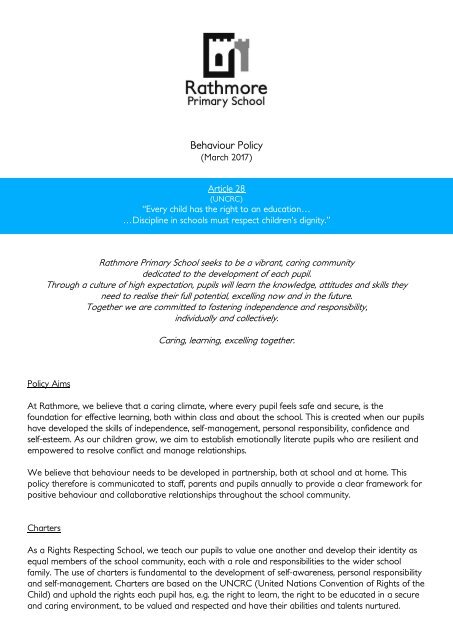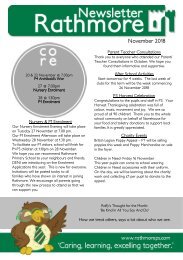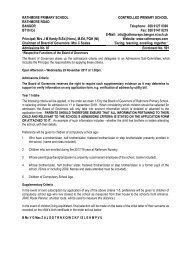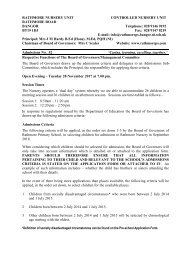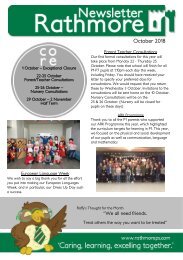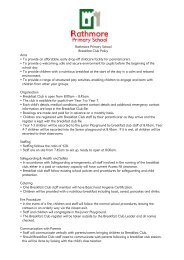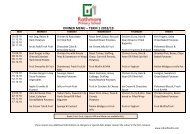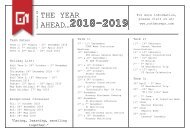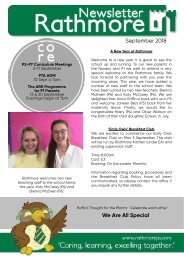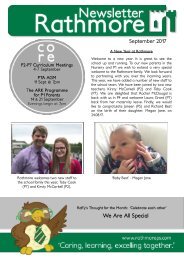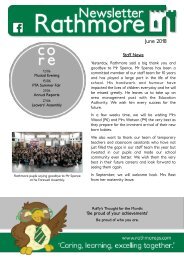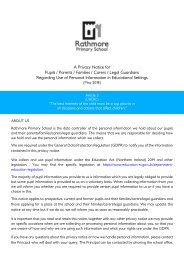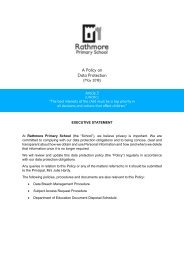Behaviour Policy
You also want an ePaper? Increase the reach of your titles
YUMPU automatically turns print PDFs into web optimized ePapers that Google loves.
<strong>Behaviour</strong> <strong>Policy</strong><br />
(March 2017)<br />
Article 28<br />
(UNCRC)<br />
“Every child has the right to an education…<br />
…Discipline in schools must respect children’s dignity.”<br />
Rathmore Primary School seeks to be a vibrant, caring community<br />
dedicated to the development of each pupil.<br />
Through a culture of high expectation, pupils will learn the knowledge, attitudes and skills they<br />
need to realise their full potential, excelling now and in the future.<br />
Together we are committed to fostering independence and responsibility,<br />
individually and collectively.<br />
Caring, learning, excelling together.<br />
<strong>Policy</strong> Aims<br />
At Rathmore, we believe that a caring climate, where every pupil feels safe and secure, is the<br />
foundation for effective learning, both within class and about the school. This is created when our pupils<br />
have developed the skills of independence, self-management, personal responsibility, confidence and<br />
self-esteem. As our children grow, we aim to establish emotionally literate pupils who are resilient and<br />
empowered to resolve conflict and manage relationships.<br />
We believe that behaviour needs to be developed in partnership, both at school and at home. This<br />
policy therefore is communicated to staff, parents and pupils annually to provide a clear framework for<br />
positive behaviour and collaborative relationships throughout the school community.<br />
Charters<br />
As a Rights Respecting School, we teach our pupils to value one another and develop their identity as<br />
equal members of the school community, each with a role and responsibilities to the wider school<br />
family. The use of charters is fundamental to the development of self-awareness, personal responsibility<br />
and self-management. Charters are based on the UNCRC (United Nations Convention of Rights of the<br />
Child) and uphold the rights each pupil has, e.g. the right to learn, the right to be educated in a secure<br />
and caring environment, to be valued and respected and have their abilities and talents nurtured.
This Charter is devised, agreed, displayed and signed by everyone in the class as well as being<br />
communicated with parents. It highlights the rights of the child alongside the behaviours and actions<br />
required to ensure these are upheld (age dependant).<br />
Our school culture is one of high expectations, it is therefore our expectation that children and adults<br />
respect these rights and behave in line with the policy.<br />
Recognition<br />
All Key Stages and classes have planned and agreed ways to recognise good behaviour and promote<br />
the rights of children to learn. This recognition is designed to encourage both an individual and group<br />
responsibility to protect the rights of every person in our school community. They include; Good to be<br />
Green Charter Focus in Foundation Stage and Charter focus in KS1 and KS2. Other examples may<br />
include;<br />
<br />
<br />
<br />
<br />
<br />
<br />
<br />
<br />
<br />
<br />
<br />
Words of praise from a staff member<br />
Written comments on work<br />
Class cubes in a jar<br />
Assembly Awards and Certificates<br />
Raffy Award<br />
Stampers, Stickers and Stars<br />
Reward Charts (class, table, individual)<br />
‘Golden Time’ with children’s input, free choice time<br />
Playground line-up award & extra play time on outdoor equipment<br />
Added responsibility eg time in a younger class working with pupils,<br />
P7 Buddy, lunchtime helper, milk helper, office helper.<br />
Consequences<br />
Consequences should protect the rights of children, discourage unwanted behaviour and teach the skills<br />
necessary for personal responsibility and healthy relationships. To achieve this, we seek to match<br />
appropriate consequences to the undesirable behaviours, reinforcing sound decision making.<br />
Examples of consequences include;<br />
(First warning) Charter reminder<br />
(Second warning) Remind the child of the charter –link to consequence<br />
(Consequence) Speak to the child and apply appropriate consequence<br />
For more serious incidents, consequences may be applied immediately.<br />
<br />
<br />
<br />
<br />
<br />
<br />
<br />
<br />
<br />
Time out in class or another class<br />
Charter reminders on desk<br />
Withdrawal of privileges<br />
Sent to Year Group Leader<br />
Sent to Key Stage Leader<br />
Sent to Vice Principal/Pastoral Care Leader<br />
Sent to Principal<br />
Suspension<br />
Expulsion<br />
In the case of a severe incident, the principal will take immediate action steps in keeping with the<br />
severity of the behaviour.
Personal Resilience<br />
Through our approach to behaviour, we aim to teach our children to identify, evaluate, express and<br />
manage their emotions. This will help them to communicate more effectively with others and negotiate<br />
situations with increasing confidence and independence.<br />
In situations that arise, staff will be sensitive to the child’s emotions and will use them as an opportunity<br />
to connect and to develop learning. They will listen to the child; label the emotion and coach the child<br />
to problem solve and take action.<br />
Monitoring of <strong>Behaviour</strong><br />
Each Key Stage Leader will monitor the behaviour of their Key Stage. Where unwanted behaviour is<br />
becoming a serious pattern, concerns will be shared with the Pastoral Care Leader and Vice<br />
Principal/Principal. Together they will decide a plan of action, link with parents and SENCO.<br />
Key Stage Leaders will report to the Leadership Team annually as to the effectiveness of this policy and<br />
recommendations for improvements.<br />
The policy will be amended if necessary.<br />
Working with Parents<br />
Rathmore works closely with parents believing a joint home/school approach is crucial in creating<br />
consistent messages about how to behave at school and home. We always try to build a supportive<br />
dialogue between home and school and we will inform parents if we have any concern about their<br />
child’s welfare or behaviour. If the school has to use consequences, we expect parents to support the<br />
actions of the school. It is vitally important that school and home work closely together.<br />
Complaints’ Procedure<br />
If there is a concern about a child or the way a child has been treated, parents should contact the class<br />
teacher in the first instance.<br />
If the concern remains, parents or staff may refer the matter to:<br />
Year Group Leader or Key Stage Leader<br />
Pastoral Care Leader or Vice Principal<br />
In the event that these discussions cannot resolve the problem then an appointment may be made with<br />
the Principal.<br />
At all stages a record will be kept.<br />
Links with Other Policies<br />
At Rathmore, we believe that a caring climate, where every pupil feels safe and secure, is the<br />
foundation for effective learning, both within class and about the school. To achieve this climate it is<br />
important for every member of the school community to understand our framework for Pastoral Care.<br />
This policy forms part of the Pastoral Care framework of Rathmore PS and therefore should be read in<br />
conjunction with our other Pastoral Care policies;<br />
Administration of Medicines<br />
Acceptable Use of the Internet<br />
Anti-Bullying<br />
Child Protection<br />
Code of Conduct for Staff<br />
Photographic and Video Images<br />
Social Media<br />
Special Needs and Inclusion<br />
Staff and Volunteers Code of Conduct


